华中科技大学计算机系统基础实验报告
华中科技大学计算机原理实验报告
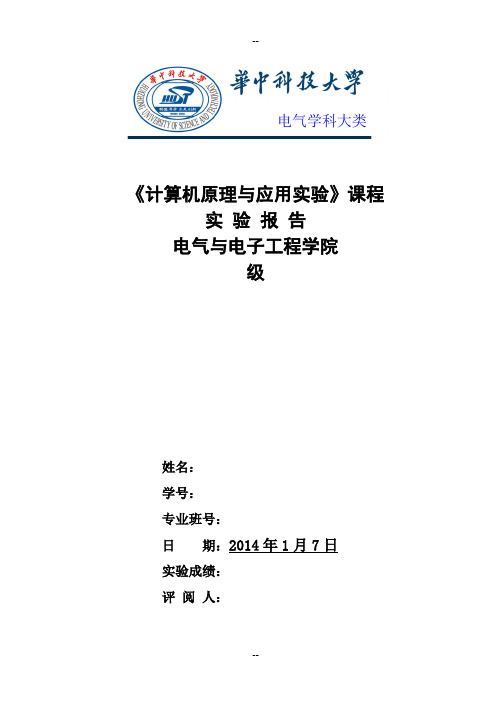
电气学科大类《计算机原理与应用实验》课程实验报告电气与电子工程学院级姓名:学号:专业班号:日期:2014年1月7日实验成绩:评阅人:实验评分表目录实验评分表错误!未指定书签。
实验一:软件安装与使用错误!未指定书签。
一、实验目的错误!未指定书签。
二、实验设备错误!未指定书签。
三、实验任务错误!未指定书签。
四、实验原理错误!未指定书签。
五、实验内容错误!未指定书签。
六、实验过程及结果错误!未指定书签。
七、实验感想八、参考文献实验二:汇编语言实例讲解与程序编写一、实验目的二、实验设备三、实验任务四、实验原理五、实验内容六、实验过程及结果七、实验感想八、参考文献实验三:基于软件的最小系统硬件设计一、实验目的二、实验设备三、实验任务四、实验原理五、实验内容六、实验过程及结果七、实验感想八、参考文献实验四:基于最小系统的汇编程序设计一、实验目的错误!未指定书签。
二、实验设备错误!未指定书签。
三、实验任务错误!未指定书签。
四、实验原理错误!未指定书签。
五、实验内容六、实验过程及结果七、实验感想八、参考文献实验五:并行接口实验(演示实验)一、实验目的二、实验设备三、实验任务四、实验原理五、实验内容六、实验过程及结果七、实验感想八、参考文献实验六:工频测频接口电路设计与实现一、实验目的二、实验设备三、实验任务四、实验原理五、实验内容六、实验过程及结果七、实验感想八、参考文献实验一:软件安装与使用一、实验目的通过本实验学习软件的安装与使用。
二、实验设备微机一台,仿真软件三、实验任务.安装仿真软件。
.利用仿真软件编程。
四、实验原理仿真软件就是在下的一种仿真软件,它可以仿真模拟的程序运行,并且可以直观地观察寄存器的变化情况。
结合了一个先进的原始编辑器、组译器、反组译器、具除错功能的软件模拟工具(虚拟),还有一个循序渐进的指导工具。
这对刚开始学组合语言的人会是一个很有用的工具。
它会在模拟器中一步一步的编译程序码并执行,视觉化的工作环境让它更容易使用。
计算机基础实验报告总结
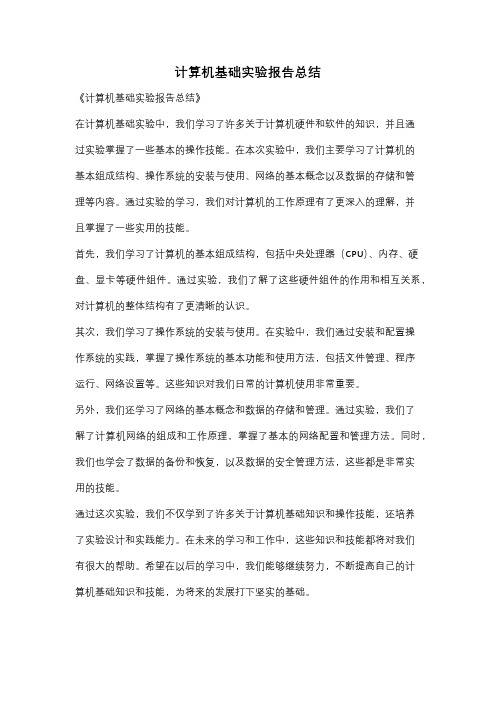
计算机基础实验报告总结
《计算机基础实验报告总结》
在计算机基础实验中,我们学习了许多关于计算机硬件和软件的知识,并且通
过实验掌握了一些基本的操作技能。
在本次实验中,我们主要学习了计算机的
基本组成结构、操作系统的安装与使用、网络的基本概念以及数据的存储和管
理等内容。
通过实验的学习,我们对计算机的工作原理有了更深入的理解,并
且掌握了一些实用的技能。
首先,我们学习了计算机的基本组成结构,包括中央处理器(CPU)、内存、硬盘、显卡等硬件组件。
通过实验,我们了解了这些硬件组件的作用和相互关系,对计算机的整体结构有了更清晰的认识。
其次,我们学习了操作系统的安装与使用。
在实验中,我们通过安装和配置操
作系统的实践,掌握了操作系统的基本功能和使用方法,包括文件管理、程序
运行、网络设置等。
这些知识对我们日常的计算机使用非常重要。
另外,我们还学习了网络的基本概念和数据的存储和管理。
通过实验,我们了
解了计算机网络的组成和工作原理,掌握了基本的网络配置和管理方法。
同时,我们也学会了数据的备份和恢复,以及数据的安全管理方法,这些都是非常实
用的技能。
通过这次实验,我们不仅学到了许多关于计算机基础知识和操作技能,还培养
了实验设计和实践能力。
在未来的学习和工作中,这些知识和技能都将对我们
有很大的帮助。
希望在以后的学习中,我们能够继续努力,不断提高自己的计
算机基础知识和技能,为将来的发展打下坚实的基础。
计算机基础实验报告总结
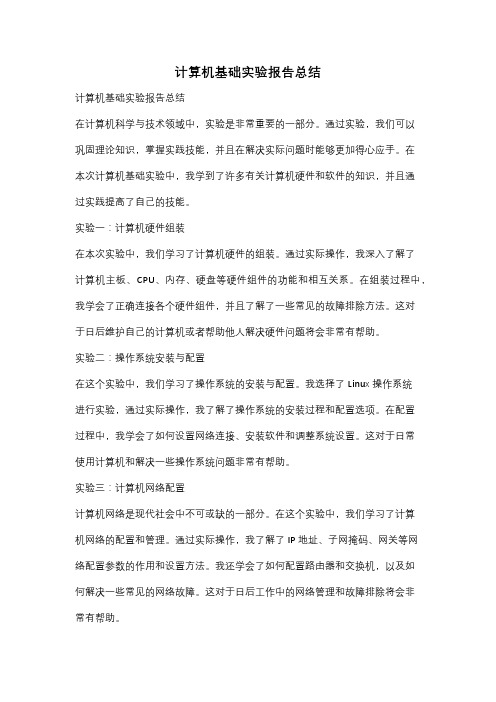
计算机基础实验报告总结计算机基础实验报告总结在计算机科学与技术领域中,实验是非常重要的一部分。
通过实验,我们可以巩固理论知识,掌握实践技能,并且在解决实际问题时能够更加得心应手。
在本次计算机基础实验中,我学到了许多有关计算机硬件和软件的知识,并且通过实践提高了自己的技能。
实验一:计算机硬件组装在本次实验中,我们学习了计算机硬件的组装。
通过实际操作,我深入了解了计算机主板、CPU、内存、硬盘等硬件组件的功能和相互关系。
在组装过程中,我学会了正确连接各个硬件组件,并且了解了一些常见的故障排除方法。
这对于日后维护自己的计算机或者帮助他人解决硬件问题将会非常有帮助。
实验二:操作系统安装与配置在这个实验中,我们学习了操作系统的安装与配置。
我选择了Linux操作系统进行实验,通过实际操作,我了解了操作系统的安装过程和配置选项。
在配置过程中,我学会了如何设置网络连接、安装软件和调整系统设置。
这对于日常使用计算机和解决一些操作系统问题非常有帮助。
实验三:计算机网络配置计算机网络是现代社会中不可或缺的一部分。
在这个实验中,我们学习了计算机网络的配置和管理。
通过实际操作,我了解了IP地址、子网掩码、网关等网络配置参数的作用和设置方法。
我还学会了如何配置路由器和交换机,以及如何解决一些常见的网络故障。
这对于日后工作中的网络管理和故障排除将会非常有帮助。
实验四:数据库管理数据库是存储和管理数据的重要工具。
在这个实验中,我们学习了数据库的创建、表的设计和数据的操作。
通过实际操作,我了解了关系型数据库的基本原理和SQL语言的使用。
我学会了如何创建表、插入数据、查询数据和更新数据。
这对于日后的数据管理和分析将会非常有帮助。
实验五:程序设计与实现在这个实验中,我们学习了程序设计和实现的基本原理和方法。
通过实际操作,我学会了使用编程语言进行程序设计,并且能够编写简单的程序解决实际问题。
我了解了程序的基本结构、变量和函数的使用,以及如何进行调试和测试。
华科_计算机系统实验报告
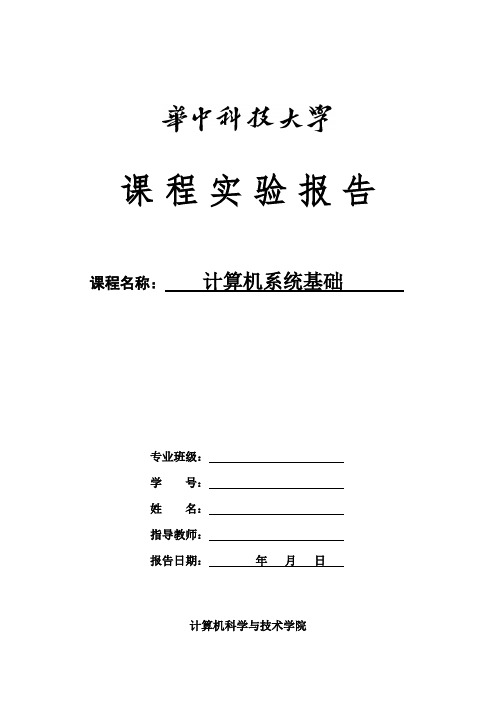
课程实验报告课程名称:计算机系统基础专业班级:学号:姓名:指导教师:报告日期:年月日计算机科学与技术学院目录实验1: (1)实验2: (7)实验3: (24)实验总结 (34)实验1:数据表示1.1 实验概述实验目的:更好地熟悉和掌握计算机中整数和浮点数的二进制编码表示。
实验目标:加深对数据二进制编码表示的了解。
实验要求:使用有限类型和数量的运算操作实现一组给定功能的函数。
实验语言:c。
实验环境:linux1.2 实验内容需要完成bits.c中下列函数功能,具体分为三大类:位操作、补码运算和浮点数操作。
1)位操作表1列出了bits.c中一组操作和测试位组的函数。
其中,“级别”栏指出各函数的难度等级(对应于该函数的实验分值),“功能”栏给出函数应实现的输出(即功能),“约束条件”栏指出你的函数实现必须满足的编码规则(具体请查看bits.c中相应函数注释),“最多操作符数量”指出你的函数实现中允许使用的操作符的最大数量。
你也可参考tests.c中对应的测试函数来了解所需实现的功能,但是注意这些测试函数并不满足目标函数必须遵循的编码约束条件,只能用做关于目标函数正确行为的参考。
表1 位操作题目列表2)补码运算表2列出了bits.c中一组使用整数的补码表示的函数。
可参考bits.c中注释说明和tests.c中对应的测试函数了解其更多具体信息。
表2 补码运算题目列表3)浮点数操作表3列出了bits.c中一组浮点数二进制表示的操作函数。
可参考bits.c中注释说明和tests.c中对应的测试函数了解其更多具体信息。
注意float_abs的输入参数和返回结果(以及float_f2i函数的输入参数)均为unsigned int类型,但应作为单精度浮点数解释其32 bit二进制表示对应的值。
表3 浮点数操作题目列表表示,当输入参数是NaN 时,返回NaN 号整型操作,包括||,&&以及if,while控制结构4 float_f2i 返回浮点数‘f’的强制整型转换“(int)f”表示仅能使用任何整型/无符号整型操作,包括||,&&以及if,while控制结构301.3 实验设计根据题目要求,选择合适的操作符来编写代码。
华中科技大学计算机系统基础实验报告
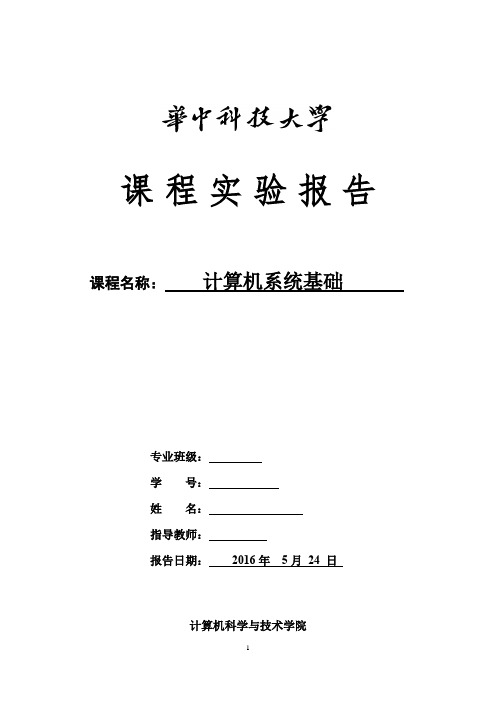
课程实验报告课程名称:计算机系统基础专业班级:学号:姓名:指导教师:报告日期:2016年5月24 日计算机科学与技术学院目录实验1: (2)实验2: (9)实验3: (22)实验总结 (30)实验1:数据表示1.1 实验概述本实验的目的是更好地熟悉和掌握计算机中整数和浮点数的二进制编码表示。
实验中,你需要解开一系列编程“难题”——使用有限类型和数量的运算操作实现一组给定功能的函数,在此过程中你将加深对数据二进制编码表示的了解。
实验语言:c; 实验环境: linux1.2 实验内容需要完成bits.c 中下列函数功能,具体分为三大类:位操作、补码运算和浮点数操作。
1.3 实验设计源码如下:/** lsbZero - set 0 to the least significant bit of x* Example: lsbZero(0x87654321) = 0x87654320* Legal ops: ! ~ & ^ | + << >>* Max ops: 5* Rating: 1*/int lsbZero(int x) {//x右移一位再左移一位实现把最低有效位置0x = x>>1;x = x<<1;return x;}/** byteNot - bit-inversion to byte n from word x* Bytes numbered from 0 (LSB) to 3 (MSB)* Examples: getByteNot(0x12345678,1) = 0x1234A978* Legal ops: ! ~ & ^ | + << >>* Max ops: 6* Rating: 2*/int byteNot(int x, int n) {//x第n个字节每位都和1异或实现取反int y = 0xff;n = n<<3;y = y<<n;x = (x^y);return x;}/** byteXor - compare the nth byte of x and y, if it is same, return 0, if not, return 1* example: byteXor(0x12345678, 0x87654321, 1) = 1* byteXor(0x12345678, 0x87344321, 2) = 0* Legal ops: ! ~ & ^ | + << >>* Max ops: 20* Rating: 2*/int byteXor(int x, int y, int n) {//把x和y的第n个字节取出来异或,再转换为逻辑的0和1n = n<<3;x = x>>n;y = y>>n;x = x&(0xff);y = y&(0xff);return !!(x^y);}/** logicalAnd - x && y* Legal ops: ! ~ & ^ | + << >>* Max ops: 20* Rating: 3*/int logicalAnd(int x, int y) {//把x和y分别转化为逻辑的0和1,再相与x = (!(!x))&(!(!y));return x;}/** logicalOr - x || y* Legal ops: ! ~ & ^ | + << >>* Max ops: 20* Rating: 3*/int logicalOr(int x, int y) {//把x和y分别转化为逻辑的0和1,再相或x = (!(!x))|(!(!y));return x;}/** rotateLeft - Rotate x to the left by n* Can assume that 0 <= n <= 31* Examples: rotateLeft(0x87654321,4) = 0x76543218* Legal ops: ~ & ^ | + << >> !* Max ops: 25* Rating: 3*/int rotateLeft(int x, int n) {//先构造低n位为1,高(32-n)位为0的数z,x左移n位后的数加上x右移(32-n)位的数&z即可int z;z = ~(((1<<31)>>31)<<n);x = ((x>>(32+(~n+1)))&z)+(x<<n);return x;}/** parityCheck - returns 1 if x contains an odd number of 1's* Examples: parityCheck(5) = 0, parityCheck(7) = 1* Legal ops: ! ~ & ^ | + << >>* Max ops: 20* Rating: 4*/int parityCheck(int x) {//每次将数的低半数位与高半数位比较,再把y右移31位,最后把y转化为逻辑的0和1int y;y = x<<16;y = y^x;y = y^(y<<8);y = y^(y<<4);y = y^(y<<2);y = y^(y<<1);y = y>>31;return !(!y);}/** mul2OK - Determine if can compute 2*x without overflow* Examples: mul2OK(0x30000000) = 1* mul2OK(0x40000000) = 0** Legal ops: ~ & ^ | + << >>* Max ops: 20* Rating: 2*/int mul2OK(int x) {//把x第31位和30位分别和1做按位与,再异或,再和1异或int m;m = ((x>>31)&0x1)^((x>>30)&0x1);return m^0x1;}/** mult3div2 - multiplies by 3/2 rounding toward 0,* Should exactly duplicate effect of C expression (x*3/2),* including overflow behavior.* Examples: mult3div2(11) = 16* mult3div2(-9) = -13* mult3div2(1073741824) = -536870912(overflow)* Legal ops: ! ~ & ^ | + << >>* Max ops: 12* Rating: 2*/int mult3div2(int x) {//左移一位再+x即x*3,右移一位的时候,当y的最高位和最低位都为0时还要+1int y = (x<<1)+x;y = (y>>1)+(((y>>31)&1)&(((y<<31)>>31)&1));return y;}/** subOK - Determine if can compute x-y without overflow* Example: subOK(0x80000000,0x80000000) = 1,* subOK(0x80000000,0x70000000) = 0,* Legal ops: ! ~ & ^ | + << >>* Max ops: 20* Rating: 3*/int subOK(int x, int y) {//x的最高有效位和y的最高有效位不同且x和(x-y)的最高位不同才能判断溢出int m = (x>>31)&1;int n = (y>>31)&1;x = (m^n)&(m^(((x+(~y+1))>>31)&1));return (!x);}/** absVal - absolute value of x* Example: absVal(-1) = 1.* You may assume -TMax <= x <= TMax* Legal ops: ! ~ & ^ | + << >>* Max ops: 10* Rating: 4*/int absVal(int x) {//x最高位为0时就是x,最高位为1时是~x+1int y = x>>31;x = (y&(~x+1))+((~y)&x);return x;}/** float_abs - Return bit-level equivalent of absolute value of f for * floating point argument f.* Both the argument and result are passed as unsigned int's, but * they are to be interpreted as the bit-level representations of * single-precision floating point values.* When argument is NaN, return argument..* Legal ops: Any integer/unsigned operations incl. ||, &&. also if, while* Max ops: 10* Rating: 2*/unsigned float_abs(unsigned uf) {int x=uf&(~(1<<31));if(x>0x7f800000){return uf;}else return x;}/** float_f2i - Return bit-level equivalent of expression (int) f* for floating point argument f.* Argument is passed as unsigned int, but* it is to be interpreted as the bit-level representation of a* single-precision floating point value.* Anything out of range (including NaN and infinity) should return * 0x80000000u.* Legal ops: Any integer/unsigned operations incl. ||, &&. also if, while* Max ops: 30* Rating: 4*/int float_f2i(unsigned uf) {unsigned num=0x80000000;int x=(uf&0x007fffff)^0x00800000;int order=0;order=(uf&0x7f800000)>>23;if(order>158){return num;}if(order<127) return 0;else if(((uf>>31)&1)==1){if(order>150){return ~(x<<(order-150))+1;}else return ~(x>>(150-order))+1;}else{if(order>150) return x<<(order-150);else return x>>(150-order);}}1.4 实验过程编写源码,运行btest,得出实验结果。
计算机基础实验报告实验一二参考模板

计算机基础实验报告实验一二参考模板一、实验目的计算机基础实验一的目的在于让学生熟悉计算机的基本操作和常用软件的使用,培养学生的动手能力和问题解决能力。
实验二则侧重于加深对计算机系统和网络知识的理解,提高学生的综合应用能力。
二、实验环境实验在学校的计算机实验室进行,每台计算机均安装了 Windows 操作系统,并配备了常用的办公软件、编程工具和网络浏览器等。
实验室还提供了稳定的网络环境,以便进行网络相关的实验操作。
三、实验内容与步骤(一)实验一1、计算机硬件的认识打开计算机主机箱,观察主板、CPU、内存、硬盘、显卡等硬件设备的外观和接口。
了解各硬件设备的主要功能和性能指标。
2、操作系统的安装与设置使用安装光盘或 U 盘启动盘,安装 Windows 操作系统。
进行系统初始化设置,如用户名、密码、日期时间等。
安装驱动程序,确保硬件设备正常工作。
3、常用办公软件的使用打开 Word 软件,进行文档的创建、编辑、排版和保存。
使用 Excel 软件进行表格的制作、数据计算和图表绘制。
利用 PowerPoint 软件创建演示文稿,添加文字、图片、动画等元素。
(二)实验二1、计算机网络基础了解计算机网络的组成、分类和拓扑结构。
学习 IP 地址、子网掩码、网关和 DNS 的概念和设置方法。
通过命令提示符(CMD)窗口,使用 Ping 命令检测网络连通性。
2、网络服务与应用配置 Web 服务器和 FTP 服务器,实现网页的发布和文件的上传下载。
学会使用浏览器访问网页、搜索信息和下载文件。
了解电子邮件的工作原理,注册邮箱并进行邮件的收发。
四、实验结果与分析(一)实验一1、硬件认识方面,学生能够准确识别计算机的主要硬件设备,并对其功能有了初步的了解。
但对于一些较新的硬件技术和性能参数的理解还不够深入。
2、操作系统的安装和设置过程较为顺利,大部分学生能够独立完成。
但在驱动程序的安装过程中,少数学生遇到了兼容性问题,需要通过更新驱动或寻求技术支持解决。
华科_计算机系统实验报告

课程实验报告课程名称:计算机系统基础专业班级:学号:姓名:指导教师:报告日期:年月日计算机科学与技术学院目录实验1: (1)实验2: (7)实验3: (24)实验总结 (34)实验1:数据表示1.1 实验概述实验目的:更好地熟悉和掌握计算机中整数和浮点数的二进制编码表示。
实验目标:加深对数据二进制编码表示的了解。
实验要求:使用有限类型和数量的运算操作实现一组给定功能的函数。
实验语言:c。
实验环境:linux1.2 实验内容需要完成bits.c中下列函数功能,具体分为三大类:位操作、补码运算和浮点数操作。
1)位操作表1列出了bits.c中一组操作和测试位组的函数。
其中,“级别”栏指出各函数的难度等级(对应于该函数的实验分值),“功能”栏给出函数应实现的输出(即功能),“约束条件”栏指出你的函数实现必须满足的编码规则(具体请查看bits.c中相应函数注释),“最多操作符数量”指出你的函数实现中允许使用的操作符的最大数量。
你也可参考tests.c中对应的测试函数来了解所需实现的功能,但是注意这些测试函数并不满足目标函数必须遵循的编码约束条件,只能用做关于目标函数正确行为的参考。
表1 位操作题目列表2)补码运算表2列出了bits.c中一组使用整数的补码表示的函数。
可参考bits.c中注释说明和tests.c中对应的测试函数了解其更多具体信息。
表2 补码运算题目列表3)浮点数操作表3列出了bits.c中一组浮点数二进制表示的操作函数。
可参考bits.c中注释说明和tests.c中对应的测试函数了解其更多具体信息。
注意float_abs的输入参数和返回结果(以及float_f2i函数的输入参数)均为unsigned int类型,但应作为单精度浮点数解释其32 bit二进制表示对应的值。
表3 浮点数操作题目列表表示,当输入参数是NaN 时,返回NaN 号整型操作,包括||,&&以及if,while控制结构4 float_f2i 返回浮点数‘f’的强制整型转换“(int)f”表示仅能使用任何整型/无符号整型操作,包括||,&&以及if,while控制结构301.3 实验设计根据题目要求,选择合适的操作符来编写代码。
华中科技大学-计算机学院-数据结构实验报告
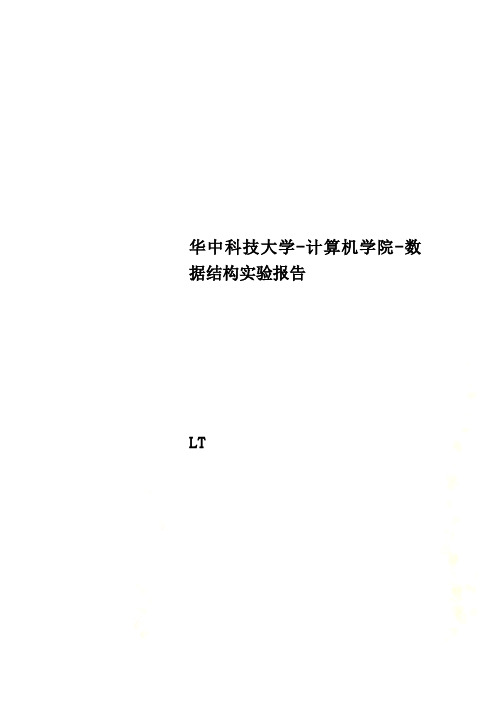
华中科技大学-计算机学院-数据结构实验报告LT目录1基于顺序存储结构实现线性表的基本运算 (1)1.1 实验目的 (1)1.2 线性表演示系统设计 (1)1.2.1 系统总体设计 (1)1.2.2 有关常量和类型定义 (1)1.2.3 算法设计 (1)1.3 线性表演示系统实现与测试 (3)1.3.1 系统实现 (3)1.3.2 系统测试 (11)1.4 实验小结 (12)2 基于链式实现线性表的基本运算 (13)2.1 问题描述 (13)2.2 线性表演示系统设计 (13)2.2.1 系统总体设计 (13)2.2.2 有关常量和类型定义 (13)2.2.3 算法设计 (13)2.3 线性表演示系统实现与测试 (15)2.3.1 系统实现 (15)2.3.2 系统测试 (24)2.4 实验小结 (25)3基于顺序存储结构实现栈的基本运算 (27)3.1实验目的 (27)3.2栈演示系统设计 (27)3.2.1 系统总体设计 (27)3.2.2 算法实现 (27)3.3 栈演示系统实现与测试 (28)3.3.1 程序实现 (28)3.3.2 系统测试 (34)3.4 实验小结 (35)4基于循环队列存储结构实现队列的基本运算 (36)4.1 问题描述 (36)4.2.1 系统总体设计 (36)4.2.2 有关常量和类型定义 (36)4.2.3 算法设计 (36)4.3 队列演示系统实现与测试 (37)4.3.1 系统实现 (37)4.3.2 系统测试 (44)4.4 实验小结 (45)5基于二叉链表实现二叉树的基本运算 (46)5.1 实验目的 (46)5.2.1 系统总体设计 (46)5.2.2 有关常量和类型定义 (46)5.2.3 算法设计 (46)5.3 二叉树演示系统实现与测试 (48)5.3.1 系统实现 (48)5.3.2 系统测试 (79)5.4 实验小结 (81)6基于邻接表实现图的基本和常见运算 (82)6.1 实验目的 (82)6.2.1 系统总体设计 (82)6.2.2 有关常量和类型定义 (82)6.2.3 算法设计 (82)6.3 图演示系统实现与测试 (83)6.3.1 系统实现 (83)6.3.2 系统测试 (101)6.4 实验小结 (103)参考文献 (104)1基于顺序存储结构实现线性表的基本运算1.1 实验目的通过实验达到:(1)加深对线性表的概念、基本运算的理解;(2)熟练掌握线性表的逻辑结构与物理结构的关系;(3)物理结构采用顺序表,熟练掌握线性表的基本运算的实现。
大学计算基础实验报告

实验名称:大学计算机基础实验实验日期:2023年11月X日实验学时:2学时实验性质:基础性实验实验目的:1. 理解并掌握计算机基础知识,包括操作系统、计算机网络、信息安全等。
2. 熟练运用计算机基本操作,提高计算机应用能力。
3. 培养实验操作技能,提高团队协作能力。
实验内容:一、操作系统实验1. 实验目的:了解操作系统的基本功能,掌握文件操作、窗口操作等基本操作。
2. 实验步骤:(1)启动计算机,进入操作系统界面。
(2)熟悉桌面环境,包括任务栏、开始菜单等。
(3)创建文件夹,并练习文件操作(如复制、粘贴、删除等)。
(4)调整窗口大小、位置,切换窗口。
(5)使用搜索功能查找文件。
3. 实验结果:成功完成上述操作,熟悉操作系统基本功能。
二、计算机网络实验1. 实验目的:了解计算机网络的基本概念,掌握网络配置、网络连接等操作。
2. 实验步骤:(1)查看网络连接状态,包括有线和无线连接。
(2)配置网络参数,如IP地址、子网掩码、默认网关等。
(3)测试网络连通性,如ping命令测试。
(4)使用浏览器访问网络资源。
3. 实验结果:成功配置网络连接,实现网络通信。
三、信息安全实验1. 实验目的:了解信息安全的基本概念,掌握杀毒软件的使用、数据加密等操作。
2. 实验步骤:(1)安装杀毒软件,并进行病毒库更新。
(2)使用杀毒软件扫描系统,查杀病毒。
(3)设置防火墙,防止恶意软件入侵。
(4)使用加密软件对数据进行加密。
3. 实验结果:成功完成上述操作,提高计算机信息安全防护能力。
四、团队协作实验1. 实验目的:培养团队协作能力,提高实验操作效率。
2. 实验步骤:(1)分组,明确各成员职责。
(2)分工合作,共同完成实验任务。
(3)交流实验心得,分享经验。
3. 实验结果:成功完成实验任务,提高团队协作能力。
实验总结:本次大学计算机基础实验,使我更加深入地了解了计算机基础知识,掌握了计算机基本操作。
通过实验,我提高了计算机应用能力,培养了团队协作精神。
华科操作系统实验报告
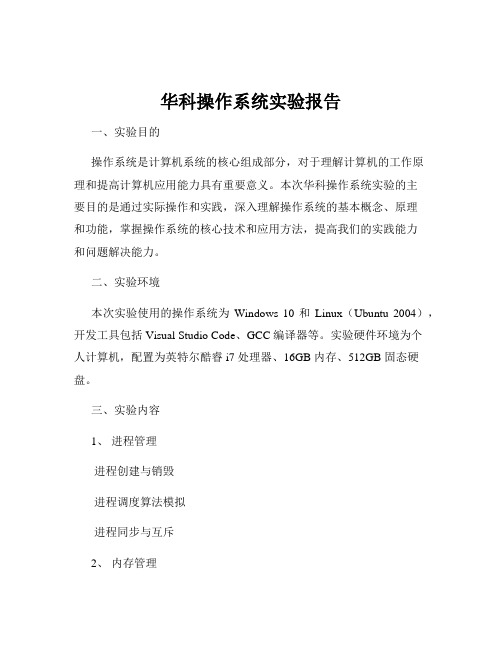
华科操作系统实验报告一、实验目的操作系统是计算机系统的核心组成部分,对于理解计算机的工作原理和提高计算机应用能力具有重要意义。
本次华科操作系统实验的主要目的是通过实际操作和实践,深入理解操作系统的基本概念、原理和功能,掌握操作系统的核心技术和应用方法,提高我们的实践能力和问题解决能力。
二、实验环境本次实验使用的操作系统为Windows 10 和Linux(Ubuntu 2004),开发工具包括 Visual Studio Code、GCC 编译器等。
实验硬件环境为个人计算机,配置为英特尔酷睿 i7 处理器、16GB 内存、512GB 固态硬盘。
三、实验内容1、进程管理进程创建与销毁进程调度算法模拟进程同步与互斥2、内存管理内存分配与回收算法实现虚拟内存管理3、文件系统文件操作与管理文件系统的实现与优化4、设备管理设备驱动程序编写设备分配与回收四、实验步骤及结果1、进程管理实验进程创建与销毁首先,使用 C 语言编写程序,通过系统调用创建新的进程。
在程序中,使用 fork()函数创建子进程,并在子进程和父进程中分别输出不同的信息,以验证进程的创建和执行。
实验结果表明,子进程和父进程能够独立运行,并输出相应的信息。
进程调度算法模拟实现了先来先服务(FCFS)、短作业优先(SJF)和时间片轮转(RR)三种进程调度算法。
通过模拟多个进程的到达时间、服务时间和优先级等参数,计算不同调度算法下的平均周转时间和平均等待时间。
实验结果显示,SJF 算法在平均周转时间和平均等待时间方面表现较好,而 RR 算法能够提供较好的响应时间和公平性。
进程同步与互斥使用信号量和互斥锁实现了进程的同步与互斥。
编写了生产者消费者问题的程序,通过信号量控制生产者和消费者对缓冲区的访问,避免了数据竞争和不一致的情况。
实验结果表明,信号量和互斥锁能够有效地实现进程间的同步与互斥,保证程序的正确性。
2、内存管理实验内存分配与回收算法实现实现了首次适应(First Fit)、最佳适应(Best Fit)和最坏适应(Worst Fit)三种内存分配算法。
计算机基础实验报告
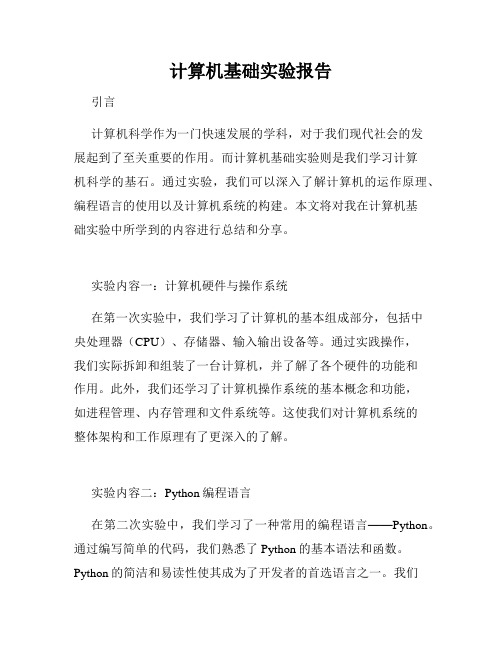
计算机基础实验报告引言计算机科学作为一门快速发展的学科,对于我们现代社会的发展起到了至关重要的作用。
而计算机基础实验则是我们学习计算机科学的基石。
通过实验,我们可以深入了解计算机的运作原理、编程语言的使用以及计算机系统的构建。
本文将对我在计算机基础实验中所学到的内容进行总结和分享。
实验内容一:计算机硬件与操作系统在第一次实验中,我们学习了计算机的基本组成部分,包括中央处理器(CPU)、存储器、输入输出设备等。
通过实践操作,我们实际拆卸和组装了一台计算机,并了解了各个硬件的功能和作用。
此外,我们还学习了计算机操作系统的基本概念和功能,如进程管理、内存管理和文件系统等。
这使我们对计算机系统的整体架构和工作原理有了更深入的了解。
实验内容二:Python编程语言在第二次实验中,我们学习了一种常用的编程语言——Python。
通过编写简单的代码,我们熟悉了Python的基本语法和函数。
Python的简洁和易读性使其成为了开发者的首选语言之一。
我们还学习了Python的常用库,如NumPy和Pandas,使我们能够更高效地处理数据和进行科学计算。
实验内容三:计算机网络与网络编程在第三次实验中,我们学习了计算机网络的基本原理和网络编程的基础知识。
我们了解了常见的网络协议,如TCP/IP和HTTP,以及网络拓扑结构和局域网的设置方法。
通过编写简单的网络程序,我们掌握了网络通信的基本操作和数据传输的原理。
这让我们更好地理解了互联网的工作原理和网络安全的重要性。
实验内容四:Java编程语言最后,我们学习了另一种常用的编程语言——Java。
Java是一种功能强大的面向对象编程语言,被广泛应用于企业级应用和大型系统的开发。
通过实践,我们熟悉了Java的语法、类和对象的概念,以及常用的开发框架和工具。
Java的跨平台特性使其成为了跨平台开发的首选语言。
结语通过计算机基础实验,我们对计算机科学的核心原理和应用有了更深入的了解。
计算机系统基础实验报告

计算机系统基础实验报告随着计算机技术的发展,如今计算机系统已成为一门重要学科,它影响着社会各个领域的发展。
计算机系统主要研究软件和硬件的基础支持、操作系统和编程技术、网络技术、安全技术等,并且被广泛应用于各个方面,如机器学习、社交网络、大数据等,是目前经济和社会发展的核心驱动力。
因此,深入地研究计算机系统的基础理论和原理,有助于更好地掌握计算机系统及其应用,加强社会发展的大背景中计算机系统的地位,发挥计算机系统在解决实际问题中的价值。
第二部分:实验目的本次实验旨在深入探索计算机系统的基础原理,加强对计算机系统的理解,学习和熟悉计算机系统的基本架构,以及相关的安全技术。
实验过程中,学习者们将设计、实现、运行相关实验,以便收获信息,反思一般原理,更好地理解安全技术等思想。
第三部分:实验内容通过本次实验,学习者将学习和实践以下内容:(1)计算机系统架构:包括CPU、内存、输入设备、输出设备、存储器、网络技术、操作系统、软件等基础技术的概念、组件的认识和工作原理;(2)深入研究主流系统架构,如PC机系统、Android系统、 Linux 系统等;(3)深入研究计算机系统的软硬件基本原理,如内存管理、安全和存储技术;(4)理解和掌握主流操作系统的基本构造、设计方法和操作原理;(5)掌握基本编程技术,以及网络传输和安全技术;(6)掌握网络通信协议、网络通信安全技术和防火墙技术等。
第四部分:实验仪器本次实验主要使用:(1)计算机硬件:如电脑、网卡、显卡、存储器等;(2)软件:操作系统(如Windows系统、Linux系统等);(3)调试和测试工具:如hex编辑器、调试软件、系统测试软件等;(4)安全工具:如病毒检测、系统审计、安全审核等;(5)网络设备:如防火墙、路由器等。
第五部分:实验过程本次实验的具体可分为以下几个步骤:(1)计算机系统架构:了解和掌握计算机系统的基本架构,包括CPU、内存、输入设备、输出设备、存储器、网络技术、操作系统、软件等;(2)主流系统架构:深入攻克PC、Android、Linux等主流系统架构,深入了解系统操作和应用原理;(3)系统安全:学习计算机系统安全技术,如存储器管理,安全检查,网络通信协议,防火墙技术等;(4)操作系统主题:掌握操作系统的基本构架、设计方法和运行原理;(5)编程技术:掌握基本编程技术,包括程序设计、算法分析、程序调试等;(6)报告编写:实验完成后,根据实验内容和实验结果,编写实验报告。
计算机基础实验报告

计算机基础实验报告计算机基础实验报告引言:计算机科学作为一门重要的学科,为我们的现代社会带来了巨大的变革和进步。
而计算机基础实验则是我们学习计算机科学的重要环节之一。
本实验报告将介绍我在计算机基础实验中所学到的知识和经验,并总结实验的结果和收获。
实验一:计算机硬件组装与调试在这个实验中,我们学习了计算机硬件的基本组成和组装方法。
通过实际操作,我了解了主板、CPU、内存、硬盘等硬件设备的功能和相互连接方式。
同时,我们还学习了如何调试计算机硬件故障,提高了我们的问题解决能力。
实验二:操作系统安装与配置在这个实验中,我们学习了操作系统的安装和配置。
通过实际操作,我掌握了Windows和Linux操作系统的安装方法和步骤,并学会了对操作系统进行基本的配置和优化。
这不仅提高了我对操作系统的理解,还为我以后的计算机使用提供了便利。
实验三:计算机网络配置与管理在这个实验中,我们学习了计算机网络的基本概念和配置方法。
通过实际操作,我了解了网络的组成和工作原理,并学会了对局域网进行基本的配置和管理。
这对于我们理解互联网的工作原理和提高网络安全意识都具有重要意义。
实验四:数据库设计与管理在这个实验中,我们学习了数据库的设计和管理。
通过实际操作,我了解了数据库的基本概念和常用的数据库管理系统,如MySQL和Oracle。
同时,我们还学习了如何设计和优化数据库结构,提高数据库的性能和安全性。
实验五:程序设计与开发在这个实验中,我们学习了程序设计和开发的基本原理和方法。
通过实际操作,我学会了使用编程语言进行程序设计,并学习了常用的开发工具和技术,如IDE和版本控制系统。
这为我以后的软件开发工作奠定了基础。
实验六:计算机安全与防护在这个实验中,我们学习了计算机安全和防护的基本知识和方法。
通过实际操作,我了解了计算机系统的安全威胁和攻击方式,并学会了如何使用防火墙和杀毒软件等工具进行计算机安全防护。
这对于保护个人隐私和防止计算机病毒的侵害具有重要意义。
计算机基础实验报告(共3篇)
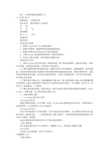
篇一:计算机基础实验报告(1)xx 实验报告课程名称计算机导论项目名称操作系统与工具软件学院专业无指导教师报告人学号实验时间提交时间一、实验目的与要求1.掌握windows或linux的基本操作;2.掌握文件管理、磁盘管理以及控制面板设置;3.熟悉汉字输入法以及金山打字软件的使用;4.了解windows注册表管理和常用工具软件的使用;5.学会自己提出问题,并得出解决问题的方法。
实验内容与方法1.了解windows的启动和关闭,桌面的组成,窗口的组成和操作,鼠标及其操作,菜单与对话框,应用程序的切换,任务栏和?开始?菜单。
2.了解?资源管理器?和?我的电脑?,懂得文件和文件夹的操作,会磁盘清理,格式化磁盘,会备份和系统还原以及虚拟内存的设置和控制面板的鼠标设置、系统日期和时间、桌面背景及屏幕保护的设置、会安装与卸载应用程序、多用户环境的设置、文件夹共享的设置、汉字输入法的设置。
3.了解安装汉字输入法,添加或删除汉字输入法,输入法的选择,输入法的快捷键设置以及智能abc输入法的使用和了解金山打字软件的启动及其窗口,打字教程,英文打字,拼音打字,速度测试,个人管理。
4.了解注册表基本结构,使用注册表,备份与还原注册表信息和会使用压缩软件、adobe acrobat、虚拟光驱。
电子图书浏览与制作工具。
三、实验步骤与过程一.1.windows的启动与关闭⑴windows的启动连接计算机的电源,打开电源,安装了windows的计算机就会自动启动,计算机将显示欢迎的界面,之后将看到windows的桌面。
⑵windows的关闭单击?开始?按钮打开?开始?菜单,在其中选择?关闭计算机?,在出现的对话框中单击选择?关闭?,系统将关闭。
2.桌面的组成:桌面上摆放了一些经常用到的或特别重要的文件夹和工具图标,使用鼠标双击想使用的应用程序即可打开相应的应用程序。
3.窗口的组成窗口的基本操作有打开与关闭窗口、调整窗口大小、移动窗口等操作步骤。
计算机基础实验报告
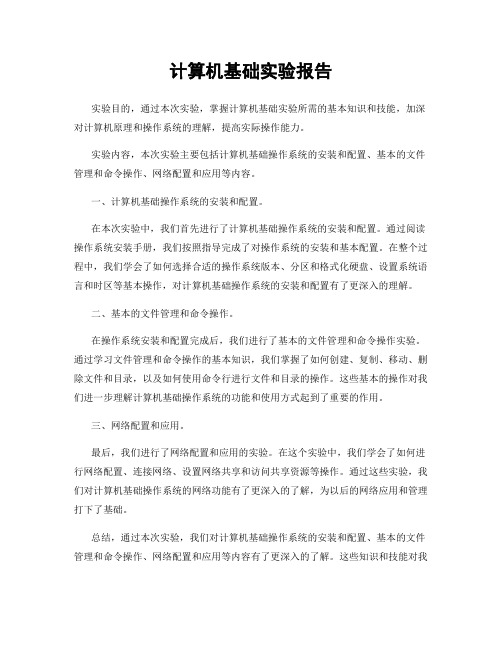
计算机基础实验报告实验目的,通过本次实验,掌握计算机基础实验所需的基本知识和技能,加深对计算机原理和操作系统的理解,提高实际操作能力。
实验内容,本次实验主要包括计算机基础操作系统的安装和配置、基本的文件管理和命令操作、网络配置和应用等内容。
一、计算机基础操作系统的安装和配置。
在本次实验中,我们首先进行了计算机基础操作系统的安装和配置。
通过阅读操作系统安装手册,我们按照指导完成了对操作系统的安装和基本配置。
在整个过程中,我们学会了如何选择合适的操作系统版本、分区和格式化硬盘、设置系统语言和时区等基本操作,对计算机基础操作系统的安装和配置有了更深入的理解。
二、基本的文件管理和命令操作。
在操作系统安装和配置完成后,我们进行了基本的文件管理和命令操作实验。
通过学习文件管理和命令操作的基本知识,我们掌握了如何创建、复制、移动、删除文件和目录,以及如何使用命令行进行文件和目录的操作。
这些基本的操作对我们进一步理解计算机基础操作系统的功能和使用方式起到了重要的作用。
三、网络配置和应用。
最后,我们进行了网络配置和应用的实验。
在这个实验中,我们学会了如何进行网络配置、连接网络、设置网络共享和访问共享资源等操作。
通过这些实验,我们对计算机基础操作系统的网络功能有了更深入的了解,为以后的网络应用和管理打下了基础。
总结,通过本次实验,我们对计算机基础操作系统的安装和配置、基本的文件管理和命令操作、网络配置和应用等内容有了更深入的了解。
这些知识和技能对我们进一步学习计算机基础理论和实际应用都具有重要的意义,为我们以后的学习和工作打下了坚实的基础。
感想,本次实验让我对计算机基础操作系统有了更深入的了解,也让我对计算机技术的学习充满了信心。
通过实际操作,我不仅学会了如何安装和配置操作系统,还学会了如何进行文件管理和命令操作,以及如何进行网络配置和应用。
这些知识和技能对我以后的学习和工作都将大有裨益。
在未来的学习和工作中,我将继续努力学习计算机基础知识,不断提升自己的技能水平,为将来的发展打下更加坚实的基础。
大学计算机基础实验报告
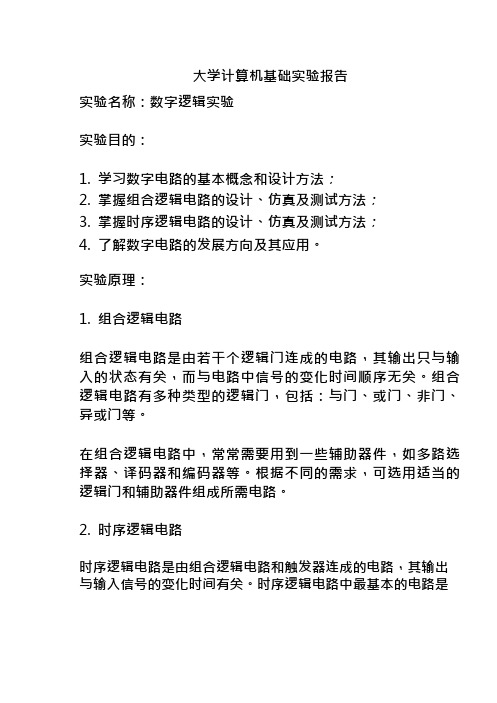
大学计算机基础实验报告实验名称:数字逻辑实验实验目的:1.学习数字电路的基本概念和设计方法;2.掌握组合逻辑电路的设计、仿真及测试方法;3.掌握时序逻辑电路的设计、仿真及测试方法;4.了解数字电路的发展方向及其应用。
实验原理:1.组合逻辑电路组合逻辑电路是由若干个逻辑门连成的电路,其输出只与输入的状态有关,而与电路中信号的变化时间顺序无关。
组合逻辑电路有多种类型的逻辑门,包括:与门、或门、非门、异或门等。
在组合逻辑电路中,常常需要用到一些辅助器件,如多路选择器、译码器和编码器等。
根据不同的需求,可选用适当的逻辑门和辅助器件组成所需电路。
2.时序逻辑电路时序逻辑电路是由组合逻辑电路和触发器连成的电路,其输出与输入信号的变化时间有关。
时序逻辑电路中最基本的电路是触发器,其有一内部状态,在时钟信号的作用下,可以根据输入信号的不同进行状态切换。
实验步骤:1.设计组合逻辑电路(1)设计一个基本的加法器电路,将两位二进制数相加,并输出结果。
(2)设计一个4位同步计数器电路,当计数未到最大值时,以固定的时间间隔进行递增,并输出当前计数的值。
2.设计时序逻辑电路(1)设计一个基本的D 触发器电路,掌握其工作原理及使用方法,并通过仿真验证其正确性。
(2)设计一个带有使能端的D 触发器电路,并通过仿真验证其正确性。
实验结果:1.实验一:基本加法器电路该电路成功实现两位二进制数的相加,输出结果为二进制数形式,并且实验结果与理论计算值相符合。
2.实验二:4 位同步计数器电路该电路在固定时间间隔内递增计数,并能正确输出当前计数值,实验结果与理论值相同。
3.实验三:D 触发器电路及带使能端的D 触发器电路实验结果分别证明了D 触发器和带有使能端的D 触发器电路的正确性。
实验结论:通过本次实验,我成功掌握了数字电路的基本概念和设计方法,并深入了解了组合逻辑和时序逻辑电路的设计、仿真及测试方法。
同时,实验还让我了解到数字电路的应用领域及发展方向,为我深入学习计算机体系结构打下了坚实的基础。
华中数实训报告
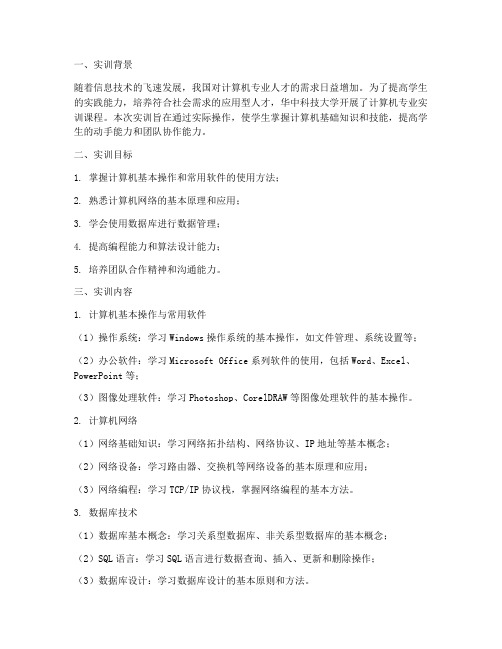
一、实训背景随着信息技术的飞速发展,我国对计算机专业人才的需求日益增加。
为了提高学生的实践能力,培养符合社会需求的应用型人才,华中科技大学开展了计算机专业实训课程。
本次实训旨在通过实际操作,使学生掌握计算机基础知识和技能,提高学生的动手能力和团队协作能力。
二、实训目标1. 掌握计算机基本操作和常用软件的使用方法;2. 熟悉计算机网络的基本原理和应用;3. 学会使用数据库进行数据管理;4. 提高编程能力和算法设计能力;5. 培养团队合作精神和沟通能力。
三、实训内容1. 计算机基本操作与常用软件(1)操作系统:学习Windows操作系统的基本操作,如文件管理、系统设置等;(2)办公软件:学习Microsoft Office系列软件的使用,包括Word、Excel、PowerPoint等;(3)图像处理软件:学习Photoshop、CorelDRAW等图像处理软件的基本操作。
2. 计算机网络(1)网络基础知识:学习网络拓扑结构、网络协议、IP地址等基本概念;(2)网络设备:学习路由器、交换机等网络设备的基本原理和应用;(3)网络编程:学习TCP/IP协议栈,掌握网络编程的基本方法。
3. 数据库技术(1)数据库基本概念:学习关系型数据库、非关系型数据库的基本概念;(2)SQL语言:学习SQL语言进行数据查询、插入、更新和删除操作;(3)数据库设计:学习数据库设计的基本原则和方法。
4. 编程与算法(1)编程语言:学习C、C++、Java等编程语言的基本语法和编程技巧;(2)数据结构:学习数组、链表、树、图等基本数据结构;(3)算法设计:学习排序、查找、动态规划等常用算法。
5. 团队合作与沟通(1)团队协作:学习团队协作的基本原则和方法,提高团队协作能力;(2)沟通技巧:学习有效的沟通技巧,提高沟通能力。
四、实训过程1. 实训准备在实训开始前,学生需了解实训课程的基本内容和要求,准备好实训所需的教材、软件等。
华科操作系统实验报告
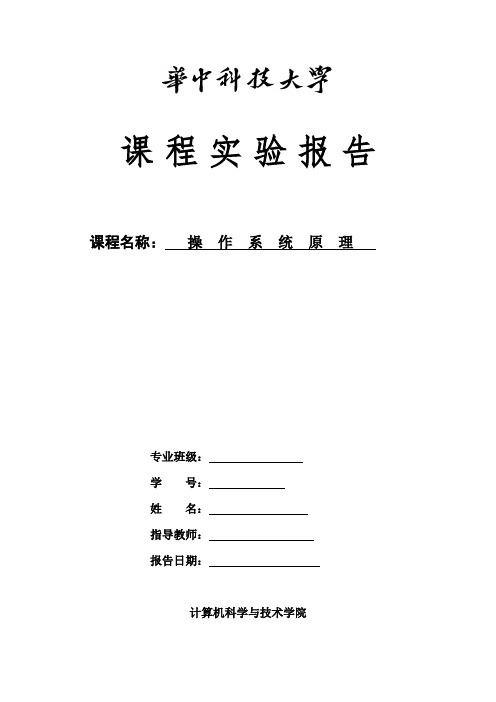
课程实验报告课程名称:操作系统原理专业班级:学号:姓名:指导教师:报告日期:计算机科学与技术学院目录目录 (2)实验一:线程的同步 (3)一、实验目的 (3)二、实验内容 (3)三、实验心得 (6)实验二:誊抄实验的进程实现 (7)一、实验目的 (7)二、实验内容 (7)三、实验心得 (10)实验三:Linux文件目录操作 (12)一、实验目的 (12)二、实验内容 (12)三、实验心得 (14)实验一:线程的同步一、实验目的1、掌握Linux系统用户界面中键盘命令的使用。
2、学会一种Linux下的编程环境。
3、掌握Linux下进(线)程的概念。
4、了解Linux进程同步与通信的主要机制,并通过信号灯操作实现进程间的同步与互斥。
二、实验内容1、程序要求两个线程,共享公共变量a线程1负责计算(+1)线程2负责打印2、运行环境软件配置(含操作系统版本):ubuntu - 14.10硬件:PC3、源程序源程序:#include <stdio.h>#include <stdlib.h>#include <pthread.h>#include <sys/types.h>#include <sys/sem.h>#include <sys/ipc.h>int semid;int a=0;typedef union senum{int val;struct semid_ds *buf;unsigned short *array;struct seminfo *_buf;}SEM_CTL_UN;void P(int semid,int index){struct sembuf sem; sem.sem_num = index; sem.sem_op = -1;//P sem.sem_flg = 0;//biaoji semop(semid,&sem,1); }void V(int semid,int index) {struct sembuf sem; sem.sem_num = index; sem.sem_op = 1; sem.sem_flg = 0; semop(semid,&sem,1); }void* thread1(void *arg) {int i=0;for(i;i<8;i++){P(semid,0);printf("add:\n");a=a+1;printf("a=%d\n",a);V(semid,1);}}void* thread2(void *arg) {int i=0;for(i;i<8;i++){P(semid,1);printf("print:\n");printf("a=%d\n",a);V(semid,0);}}int main(){pthread_t id1,id2;int ret1,ret2;key_t key;SEM_CTL_UN semctlarg1;SEM_CTL_UN semctlarg2;key=1;semid=semget(key,2,IPC_CREAT|0666);//创建semctlarg1.val=1;semctlarg2.val=0;semctl(semid,0,SETV AL,semctlarg1);//初始化semctl(semid,1,SETV AL,semctlarg2);ret1=pthread_create(&id1,NULL,thread1,NULL);ret2=pthread_create(&id2,NULL,thread2,NULL);pthread_join(id1,NULL);pthread_join(id2,NULL);}4、实验结果实验结果截图如下:图1-1 线程同步三、实验心得通过本次实验,我掌握了Linux系统用户界面中键盘命令的使用,熟悉了Linux下的编程环境,进一步理解并掌握了线程的概念,了解了线程同步与通信的主要机制,并能通过信号灯操作实现线程间的同步和互斥。
华中科技大学计算机系统基础实验报告
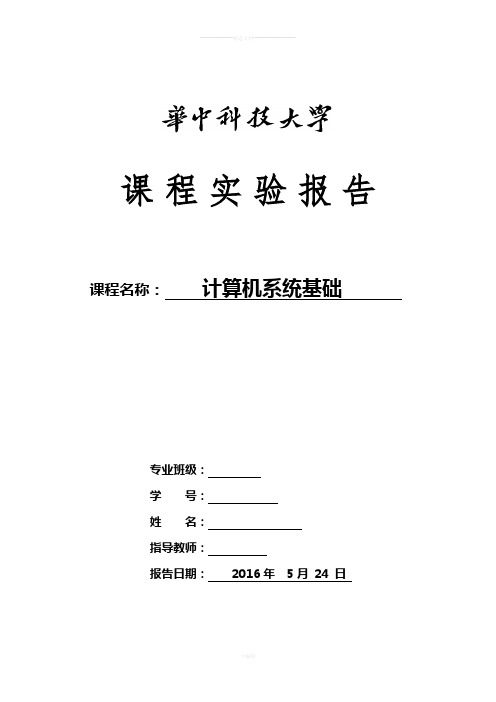
课程实验报告课程名称:计算机系统基础专业班级:学号:姓名:指导教师:报告日期:2016年5月24 日计算机科学与技术学院目录实验1: (3)实验2: (13)实验3: (28)实验总结 (37)实验1:数据表示1.1 实验概述本实验的目的是更好地熟悉和掌握计算机中整数和浮点数的二进制编码表示。
实验中,你需要解开一系列编程“难题”——使用有限类型和数量的运算操作实现一组给定功能的函数,在此过程中你将加深对数据二进制编码表示的了解。
实验语言:c; 实验环境: linux1.2 实验内容需要完成bits.c 中下列函数功能,具体分为三大类:位操作、补码运算和浮点数操作。
1.3 实验设计源码如下:/** lsbZero - set 0 to the least significant bit of x* Example: lsbZero(0x87654321) = 0x87654320* Legal ops: ! ~ & ^ | + << >>* Max ops: 5* Rating: 1*/int lsbZero(int x) {//x右移一位再左移一位实现把最低有效位置0x = x>>1;x = x<<1;return x;}/** byteNot - bit-inversion to byte n from word x* Bytes numbered from 0 (LSB) to 3 (MSB)* Examples: getByteNot(0x12345678,1) = 0x1234A978* Legal ops: ! ~ & ^ | + << >>* Max ops: 6* Rating: 2*/int byteNot(int x, int n) {//x第n个字节每位都和1异或实现取反int y = 0xff;n = n<<3;y = y<<n;x = (x^y);return x;}/** byteXor - compare the nth byte of x and y, if it is same, return 0, ifnot, return 1* example: byteXor(0x12345678, 0x87654321, 1) = 1* byteXor(0x12345678, 0x87344321, 2) = 0* Legal ops: ! ~ & ^ | + << >>* Max ops: 20* Rating: 2*/int byteXor(int x, int y, int n) {//把x和y的第n个字节取出来异或,再转换为逻辑的0和1 n = n<<3;x = x>>n;y = y>>n;x = x&(0xff);y = y&(0xff);return !!(x^y);}/** logicalAnd - x && y* Legal ops: ! ~ & ^ | + << >>* Max ops: 20* Rating: 3*/int logicalAnd(int x, int y) {//把x和y分别转化为逻辑的0和1,再相与x = (!(!x))&(!(!y));return x;}/** logicalOr - x || y* Legal ops: ! ~ & ^ | + << >>* Max ops: 20* Rating: 3*/int logicalOr(int x, int y) {//把x和y分别转化为逻辑的0和1,再相或x = (!(!x))|(!(!y));return x;}/** rotateLeft - Rotate x to the left by n* Can assume that 0 <= n <= 31* Examples: rotateLeft(0x87654321,4) = 0x76543218 * Legal ops: ~ & ^ | + << >> !* Max ops: 25* Rating: 3*/int rotateLeft(int x, int n) {//先构造低n位为1,高(32-n)位为0的数z,x左移n位后的数加上x右移(32-n)位的数&z即可int z;z = ~(((1<<31)>>31)<<n);x = ((x>>(32+(~n+1)))&z)+(x<<n);return x;}/** parityCheck - returns 1 if x contains an odd number of 1's* Examples: parityCheck(5) = 0, parityCheck(7) = 1* Legal ops: ! ~ & ^ | + << >>* Max ops: 20* Rating: 4*/int parityCheck(int x) {//每次将数的低半数位与高半数位比较,再把y右移31位,最后把y转化为逻辑的0和1int y;y = x<<16;y = y^x;y = y^(y<<8);y = y^(y<<4);y = y^(y<<2);y = y^(y<<1);y = y>>31;return !(!y);}/** mul2OK - Determine if can compute 2*x without overflow * Examples: mul2OK(0x30000000) = 1* mul2OK(0x40000000) = 0** Legal ops: ~ & ^ | + << >>* Max ops: 20* Rating: 2*/int mul2OK(int x) {//把x第31位和30位分别和1做按位与,再异或,再和1异或int m;m = ((x>>31)&0x1)^((x>>30)&0x1);return m^0x1;}/** mult3div2 - multiplies by 3/2 rounding toward 0,* Should exactly duplicate effect of C expression (x*3/2),* including overflow behavior.* Examples: mult3div2(11) = 16* mult3div2(-9) = -13* mult3div2(1073741824) = -536870912(overflow)* Legal ops: ! ~ & ^ | + << >>* Max ops: 12* Rating: 2*/int mult3div2(int x) {//左移一位再+x即x*3,右移一位的时候,当y的最高位和最低位都为0时还要+1int y = (x<<1)+x;y = (y>>1)+(((y>>31)&1)&(((y<<31)>>31)&1));return y;}/** subOK - Determine if can compute x-y without overflow* Example: subOK(0x80000000,0x80000000) = 1,* subOK(0x80000000,0x70000000) = 0,* Legal ops: ! ~ & ^ | + << >>* Max ops: 20* Rating: 3*/int subOK(int x, int y) {//x的最高有效位和y的最高有效位不同且x和(x-y)的最高位不同才能判断溢出int m = (x>>31)&1;int n = (y>>31)&1;x = (m^n)&(m^(((x+(~y+1))>>31)&1));return (!x);}/** absVal - absolute value of x* Example: absVal(-1) = 1.* You may assume -TMax <= x <= TMax* Legal ops: ! ~ & ^ | + << >>* Max ops: 10* Rating: 4*/int absVal(int x) {//x最高位为0时就是x,最高位为1时是~x+1int y = x>>31;x = (y&(~x+1))+((~y)&x);return x;}/** float_abs - Return bit-level equivalent of absolute value of f for* floating point argument f.* Both the argument and result are passed as unsigned int's, but* they are to be interpreted as the bit-level representations of* single-precision floating point values.* When argument is NaN, return argument..* Legal ops: Any integer/unsigned operations incl. ||, &&. also if, while * Max ops: 10* Rating: 2*/unsigned float_abs(unsigned uf) {int x=uf&(~(1<<31));if(x>0x7f800000){return uf;else return x;}/** float_f2i - Return bit-level equivalent of expression (int) f* for floating point argument f.* Argument is passed as unsigned int, but* it is to be interpreted as the bit-level representation of a* single-precision floating point value.* Anything out of range (including NaN and infinity) should return * 0x80000000u.* Legal ops: Any integer/unsigned operations incl. ||, &&. also if, while * Max ops: 30* Rating: 4*/int float_f2i(unsigned uf) {unsigned num=0x80000000;int x=(uf&0x007fffff)^0x00800000;int order=0;order=(uf&0x7f800000)>>23;if(order>158){return num;if(order<127) return 0;else if(((uf>>31)&1)==1){if(order>150){return ~(x<<(order-150))+1;}else return ~(x>>(150-order))+1;}else{if(order>150) return x<<(order-150);else return x>>(150-order);}}1.4 实验过程编写源码,运行btest,得出实验结果。
华中科技大学大学计算机学院--数据库实验报告
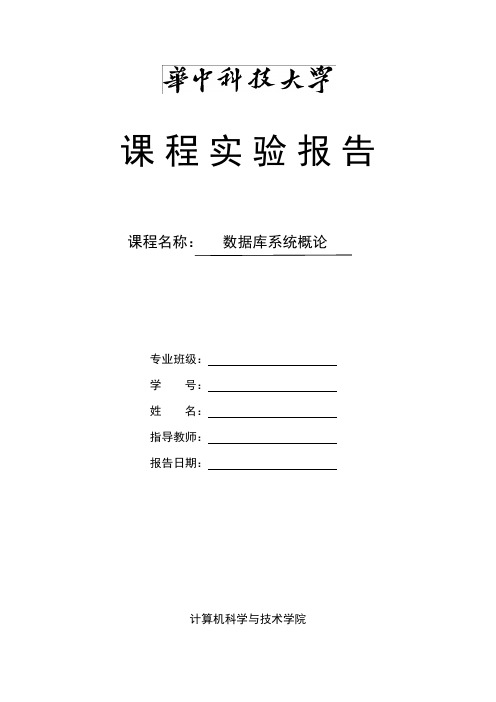
※查询结果:(图 2-3 所示)
图 2-3 查询结果
______________________ 第 6 页/共 25 页
华中科技大学
计算机学院数据库系统概论实验报告
create table p ( pno varchar(20) primary key, pname varchar(20), color varchar(20), weight varchar(20));
create table j ( jno varchar(20) primary key, jname varchar(20), city varchar(20));
图 3-3 查询结果
______________________ 第 8 页/共 25 页
华中科技大学
计算机学院数据库系统概论实验报告
U201014281
(4)找出工程项目 J2 使用的各种零件的名称及其数量; ※查询语句为:
select p.pname,spj.qty from spj,p where spj.pno=p.pno and jno='J2'; ※查询结果:(图 3-4 所示)
select pname,color,weight from p; ※查询结果:(图 3-2 所示)
图 3-2 查询结果
(3)找出使用供应商 S1 所提供零件的工程号码; ※查询语句为:
select distinct pno from spj where sno='S1'; ※查询结果:(图 3-3 所示)
- 1、下载文档前请自行甄别文档内容的完整性,平台不提供额外的编辑、内容补充、找答案等附加服务。
- 2、"仅部分预览"的文档,不可在线预览部分如存在完整性等问题,可反馈申请退款(可完整预览的文档不适用该条件!)。
- 3、如文档侵犯您的权益,请联系客服反馈,我们会尽快为您处理(人工客服工作时间:9:00-18:30)。
课程实验报告课程名称:计算机系统基础专业班级:学号:姓名:指导教师:报告日期: 2016年 5月 24 日计算机科学与技术学院目录实验1: (2)实验2: (9)实验3: (23)实验总结 (32)实验1:数据表示1.1 实验概述本实验的目的是更好地熟悉和掌握计算机中整数和浮点数的二进制编码表示。
实验中,你需要解开一系列编程“难题”——使用有限类型和数量的运算操作实现一组给定功能的函数,在此过程中你将加深对数据二进制编码表示的了解。
实验语言:c; 实验环境: linux1.2 实验容需要完成 bits.c 中下列函数功能,具体分为三大类:位操作、补码运算和浮点数操作。
1.3 实验设计源码如下:/** lsbZero - set 0 to the least significant bit of x* Example: lsbZero(0x87654321) = 0x87654320* Legal ops: ! ~ & ^ | + << >>* Max ops: 5* Rating: 1*/int lsbZero(int x) {//x右移一位再左移一位实现把最低有效位置0x = x>>1;x = x<<1;return x;}/** byteNot - bit-inversion to byte n from word x* Bytes numbered from 0 (LSB) to 3 (MSB)* Examples: getByteNot(0x12345678,1) = 0x1234A978* Legal ops: ! ~ & ^ | + << >>* Max ops: 6* Rating: 2*/int byteNot(int x, int n) {//x第n个字节每位都和1异或实现取反int y = 0xff;n = n<<3;y = y<<n;x = (x^y);return x;}/** byteXor - compare the nth byte of x and y, if it is same, return 0, if not, return 1* example: byteXor(0x12345678, 0x87654321, 1) = 1* byteXor(0x12345678, 0x87344321, 2) = 0* Legal ops: ! ~ & ^ | + << >>* Max ops: 20* Rating: 2*/int byteXor(int x, int y, int n) {//把x和y的第n个字节取出来异或,再转换为逻辑的0和1n = n<<3;x = x>>n;y = y>>n;x = x&(0xff);y = y&(0xff);return !!(x^y);}/** logicalAnd - x && y* Legal ops: ! ~ & ^ | + << >>* Max ops: 20* Rating: 3*/int logicalAnd(int x, int y) {//把x和y分别转化为逻辑的0和1,再相与x = (!(!x))&(!(!y));return x;}/** logicalOr - x || y* Legal ops: ! ~ & ^ | + << >>* Max ops: 20* Rating: 3*/int logicalOr(int x, int y) {//把x和y分别转化为逻辑的0和1,再相或x = (!(!x))|(!(!y));return x;}/** rotateLeft - Rotate x to the left by n* Can assume that 0 <= n <= 31* Examples: rotateLeft(0x87654321,4) = 0x76543218* Legal ops: ~ & ^ | + << >> !* Max ops: 25* Rating: 3*/int rotateLeft(int x, int n) {//先构造低n位为1,高(32-n)位为0的数z,x左移n位后的数加上x右移(32-n)位的数&z即可int z;z = ~(((1<<31)>>31)<<n);x = ((x>>(32+(~n+1)))&z)+(x<<n);return x;}/** parityCheck - returns 1 if x contains an odd number of 1's* Examples: parityCheck(5) = 0, parityCheck(7) = 1* Legal ops: ! ~ & ^ | + << >>* Max ops: 20* Rating: 4*/int parityCheck(int x) {//每次将数的低半数位与高半数位比较,再把y右移31位,最后把y转化为逻辑的0和1int y;y = x<<16;y = y^x;y = y^(y<<8);y = y^(y<<4);y = y^(y<<2);y = y^(y<<1);y = y>>31;return !(!y);}/** mul2OK - Determine if can compute 2*x without overflow* Examples: mul2OK(0x30000000) = 1* mul2OK(0x40000000) = 0** Legal ops: ~ & ^ | + << >>* Max ops: 20* Rating: 2*/int mul2OK(int x) {//把x第31位和30位分别和1做按位与,再异或,再和1异或int m;m = ((x>>31)&0x1)^((x>>30)&0x1);return m^0x1;}/** mult3div2 - multiplies by 3/2 rounding toward 0,* Should exactly duplicate effect of C expression (x*3/2),* including overflow behavior.* Examples: mult3div2(11) = 16* mult3div2(-9) = -13* mult3div2(1073741824) = -536870912(overflow)* Legal ops: ! ~ & ^ | + << >>* Max ops: 12* Rating: 2*/int mult3div2(int x) {//左移一位再+x即x*3,右移一位的时候,当y的最高位和最低位都为0时还要+1int y = (x<<1)+x;y = (y>>1)+(((y>>31)&1)&(((y<<31)>>31)&1));return y;}/** subOK - Determine if can compute x-y without overflow* Example: subOK(0x80000000,0x80000000) = 1,* subOK(0x80000000,0x70000000) = 0,* Legal ops: ! ~ & ^ | + << >>* Max ops: 20* Rating: 3*/int subOK(int x, int y) {//x的最高有效位和y的最高有效位不同且x和(x-y)的最高位不同才能判断溢出int m = (x>>31)&1;int n = (y>>31)&1;x = (m^n)&(m^(((x+(~y+1))>>31)&1));return (!x);}/** absVal - absolute value of x* Example: absVal(-1) = 1.* You may assume -TMax <= x <= TMax* Legal ops: ! ~ & ^ | + << >>* Max ops: 10* Rating: 4*/int absVal(int x) {//x最高位为0时就是x,最高位为1时是~x+1int y = x>>31;x = (y&(~x+1))+((~y)&x);return x;}/** float_abs - Return bit-level equivalent of absolute value of f for * floating point argument f.* Both the argument and result are passed as unsigned int's, but * they are to be interpreted as the bit-level representations of * single-precision floating point values.* When argument is NaN, return argument..* Legal ops: Any integer/unsigned operations incl. ||, &&. also if, while* Max ops: 10* Rating: 2*/unsigned float_abs(unsigned uf) {int x=uf&(~(1<<31));if(x>0x7f800000){return uf;}else return x;}/** float_f2i - Return bit-level equivalent of expression (int) f* for floating point argument f.* Argument is passed as unsigned int, but* it is to be interpreted as the bit-level representation of a* single-precision floating point value.* Anything out of range (including NaN and infinity) should return * 0x80000000u.* Legal ops: Any integer/unsigned operations incl. ||, &&. also if, while* Max ops: 30* Rating: 4*/int float_f2i(unsigned uf) {unsigned num=0x80000000;int x=(uf&0x007fffff)^0x00800000;int order=0;order=(uf&0x7f800000)>>23;if(order>158){return num;}if(order<127) return 0;else if(((uf>>31)&1)==1){if(order>150){return ~(x<<(order-150))+1;}else return ~(x>>(150-order))+1;}else{if(order>150) return x<<(order-150);else return x>>(150-order);}}1.4 实验过程编写源码,运行btest,得出实验结果。
